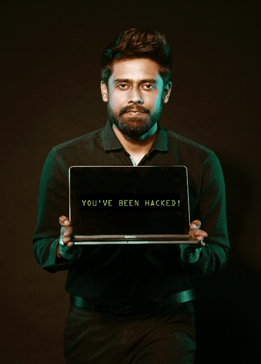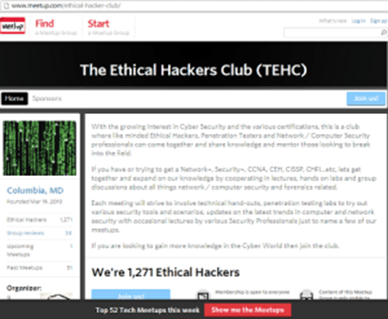
Do you possess any of these traits? Enterprising. Investigative. Inquisitive. Curious. Methodical. Calculated. Patience. Does this sound like you? Do you get excited thinking about firewalls and encrypted websites? Are you interested in being one of the good guys that help stop criminal hackers? If you fit this description, you probably are an ethical hacker or you have what it takes to become one. Do you think you have the potential to be an effective ethical hacker?
What is an Ethical Hacker?
Before we begin, it is important that we define what an ethical hacker is and what they actually do. The TrainACE definition of a certified ethical hacker is someone that is employed or sub-contracted by an organization to break into their computer infrastructure and systems. Ethical hackers will do this by applying a wide range of techniques and tools.
We have put together a top seven list of tips that any aspiring or current ethical hacker can use as a blueprint to success.
- Be knowledgeable about all operating systems
The most important operating system for an ethical hacker to know is Linux. This is due to the fact that Linux is the most popular choice for hackers because of its open source platform and compatibility with popular hacking tools. Linux distributions, or “distros”, are used to help security pros with ethical hacking and pen tests. A “distro” is a version of the open-source operating system that contain other components to help people utilize it for specific purposes. The other obvious operating system that ethical hackers should be well-versed in is Windows. Windows still remains one of the most hacked operating systems in the world. As an ethical hacker, it is in your best interest to be a jack of all trades when it comes to operating systems.
- Be multi-skilled in coding and languages
In order to be a successful ethical hacker, it’s important to have a skill set that includes these programming languages:
- Python
- JavaScript
- C
- Perl
- PHP
- SQL
- Get involved with the hacker community
It is an absolute must that you network and meet other aspiring or expert ethical hackers. Bottom line, you can obtain a wealth of knowledge by joining forums and group discussions on various sites. If you are more of leader, you can form your own group with your own guidelines. In any case, you should be able to find a multitude of communities on Discord, Facebook, Telegram, and more platforms. Especially in the hacker community, networking is essential to learning the latest and relevant practices. So go out there and connect with your peers to exchange thoughts and information.

*Meet-up groups are great resources to link with other members of the community and exchange ideas and advice.
- Know the common and current hacking techniques
It is imperative to be familiar with these tactics to help execute the most solid defense. Lastly, learning about these techniques that hackers actually use to penetrate systems will help you anticipate vulnerabilities before they come dangerous or fatal. The following list features some of the core techniques utilized by hackers in general.
- Social engineering – influencing people to reveal confidential information (example: passwords)
- Keylogging – recording the keystrokes of users from a specific computer to acquire passwords or other confidential information
- Trojans – a program that pretends to be a different one to gain backdoor access to a system
- Rootkits – a software that allows an unauthorized user to gain control of a computer system without being discovered
- Viruses – probably the most popular way to compromise a system is by introducing it to a virus or a payload
- Packet sniffing – a method of intercepting Wi-Fi or Ethernet data packets to steal data such as passwords
- Vulnerability scanning – evaluating computers or networks for weaknesses or flaws. An example of this is port scanning
- Password cracking – using methods such as cyberstalking in order to obtain clues about their passwords
- Always use unique and alternative approaches.
Thinking unconventionally is a skill that separates a decent ethical hacker from an excellent one. Using unique methods to attack a system makes it more difficult for your attempt to be seen and countered. It is up to you to avoid being predictable so you’re your tactics won’t be anticipated. Having a distinctive or combinations of attack vectors can definitely make a huge difference. Do your homework and think of multiple ways to expose and exploit your target system. Your methods should never be basic or distinguishable. Hacking is like chess and it involves a different way of looking at problems that no one else has thought of.
- Always do your own research.
Don't just depend on research and findings of other people. You should always brainstorm to formalize your own techniques and skillset. If you can’t find the perfect tool to solve a problem, you should create your own. You should also aim to be a trendsetter. Have a new or interesting idea? Research it and share the results with the rest of the community so that they can benefit from it too. There is always something to learn as an ethical hacker and it is important that you stay hungry for that knowledge.
- Get a Certification.
Companies want to know what your qualifications are before they can even give you interview and even if you are already working in the industry, certifications can help you get to that next level. Organizations are increasingly using formal certifications when recruiting ethical hackers. If you are starting without much experience, you should probably learn fundamental computer and networking skills before you start studying for a certificate like CEH.
Different Certifications and Training offered in Maryland
TrainACE provides training for a variety of certification courses that can help you be successful as a certified ethical hacker. Here is an overview of the courses that they offer.
- CompTIA Security plus – Great certification to provide fundamental skills in cybersecurity
- EC’s Certified Ethical Hacker – Trusted and respected ethical hacking training program
- CHFI – Computer Hacking Forensic Investigator course
- CompTIA Pentest plus – An intermediate-level, cyber security skills accreditation, for professionals who are tasked with hands-on penetration testing
